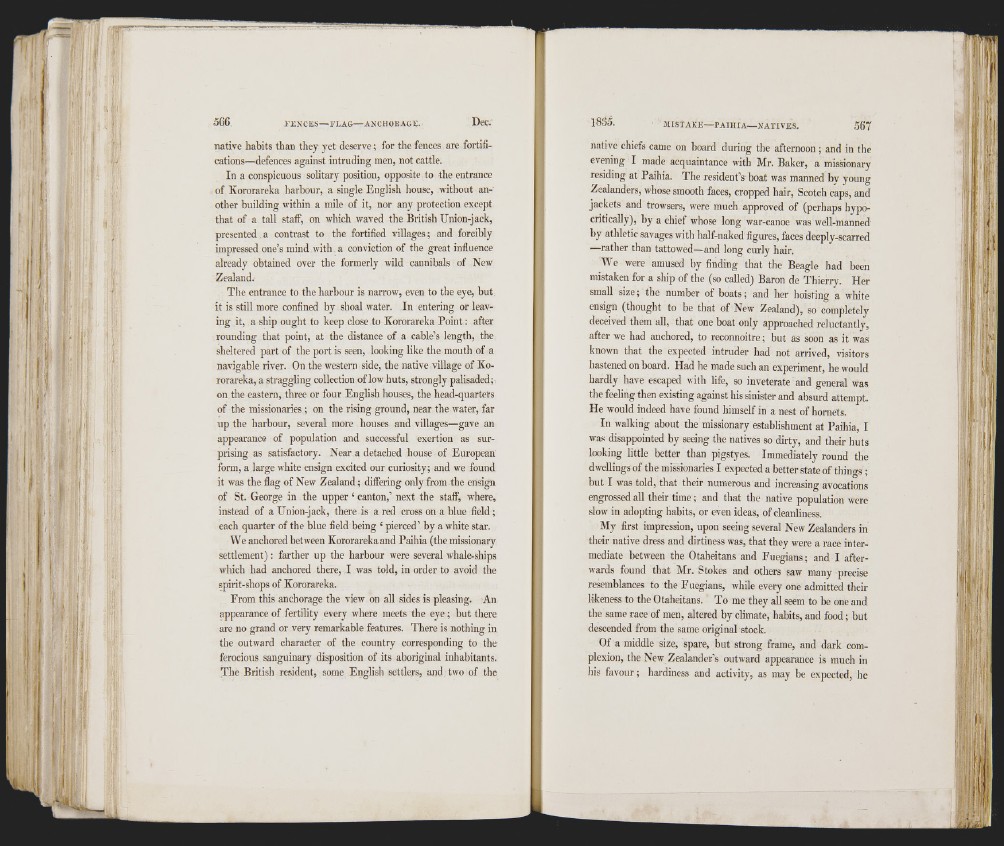
r
1
i j!!
i' S '
li
I;
! ■ ■
L u L ,
r i j j i
i ll 0
|, 1 " I ' i
ilk
[ " 01
i
I'
I " i
■ a: r.,1 ;I
i f
l l : :
1 1 1 1 f \ ' J i ,
?■ •
i . u- I f
iii
V
- p - Jl
566
native habits than they yet deserve; for the fences are fortifications—
defences against intruding men, not cattle.
In a conspicuous solitary position, opposite to the entrance
of Kororareka harbour, a single English house, without another
building within a mile of it, nor any protection except
that of a tall staff, on which waved the British Union-jack,
presented a contrast to the fortified villages; and forcibly
impressed one’s mind with a conviction of the great influence
already obtained over the formerly wild cannibals of New
Zealand.
The entrance to the harbour is narrow, even to the eye, but
it is still more confined by shoal water. In entering or leaving
it, a ship ought to keep close to Kororareka Point: after
rounding that point, at the distance of a cable’s length, the
sheltered part of the port is seen, looking like the mouth of a
navigable river. On the western side, the native village of Kororareka,
a straggling collection of low huts, strongly palisaded;
on the eastern, three or four English houses, the head-quarters
of the missionaries ; on the rising ground, near the water, far
up the harbour, several more houses and villages—gave an
appearance of population and successful exertion as surprising
as satisfactory. Near a detached house of European
form, a large white ensign excited our curiosity; and we found
it was the flag of New Zealand; differing only from the ensign
of St. George in the upper ‘ canton,’ next the staff, where,
instead of a Union-jack, there is a red cross on a blue field;
each quarter of the blue field being ‘ pierced’ by a white star.
We anchored between Kororareka and Paihia (the missionary
settlement) ; farther up the harbour were several whale-ships
which had anchored there, I was told, in order to avoid the
spirit-shops of Kororareka.
From this anchorage the view on all sides is pleasing. An
appearance of fertility every where meets the eye ; but there
are no grand or very remarkable features. There is nothing in
the outward character of the country corresponding to the
ferocious sanguinary disposition of its aboriginal inhabitants.
The British resident, some English settlers, and two of the
native chiefs came on board during the afternoon ; and in the
evening I made acquaintance with Mr. Baker, a missionary
residing at Paihia. The resident’s boat was manned by young
Zealanders, whose smooth faces, cropped hair, Scotch caps, and
jackets and trowsers, were much approved of (perhaps hypocritically),
by a chief whose long war-canoe was well-manned
by athletic savages with half-naked figures, faces deeply-scarred
—rather than tattowed—and long curly hair.
We were amused by finding that the Beagle had been
mistaken for a ship of the (so called) Baron de Thierry. Her
small size; the number of boats; and her hoisting a white
ensign (thought to be that of New Zealand), so completely
deceived them all, that one boat only approached reluctantly,
after we had anchored, to reconnoitre; but as soon as it was
known that the expected intruder had not arrived, visitors
hastened on boai-d. Had he made such an experiment, he would
hardly have escaped with life, so inveterate and general was
the feeling then existing against his sinister and absurd attempt.
He would indeed have found himself in a nest of hornets.
In walking about the missionary establishment at Paihia, I
was disappointed by seeing the natives so dirty, and their huts
looking little better than pigstyes. Immediately round the
dwellings of the missionaries I expected a better state of things ;
but I was told, that their numerous and increasing avocations
engrossed all their time; and that the native population were
slow in adopting habits, or even ideas, of cleanliness.
My first impression, upon seeing several New Zealanders in
their native dress and dirtiness was, that they were a race intermediate
between the Otaheitans and Fuegians; and I afterwards
found that Mr. Stokes and others saw many precise
resemblances to the F uegians, while every one admitted their
likeness to the Otaheitans. To me they all seem to be one and
the same race of men, altered by climate, habits, and food; but
descended from the same original stock.
Of a middle size, spare, but strong frame, and dark complexion,
the New Zealander’s outward appeai-ance is much in
his favour; hardiness and activity, as may be expected, he
■] (li
If 11
Iff
- N
f l ' i
j l .
f l T
I i